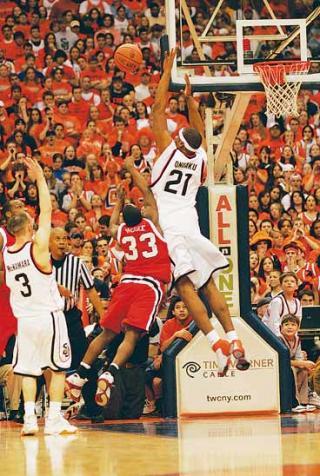|
The weeks of speculation are over. The brackets have been filled, and all we can do now is watch. March Madness is officially under way. For the next few weeks, millions of basketball fans will be glued to their televisions, watching the best 64 college basketball teams in the nation play in a single-elimination tournament until only one is left standing. For the fans, this equates to 48 games from now until Sunday. And then twelve more games next weekend. And then three more the weekend after. With so many games played in such a short period of time and with the high value that is placed on statistics in sports, one would imagine that such a tournament would be of great interest to mathematicians and computer scientists. They could use their expertise to better predict the winner.
Sheldon H. Jacobson, a professor of computer science at the University of Illinois at Urbana-Champaign, has done just that. Sort of. Professor Jacobson studied the value of a team’s seeding in relation to how far they make it in the “Big Dance.” In the NCAA tournament, the 64 teams are broken into four groups of sixteen, so that each team is ranked between one and sixteen. The highest seed (one) is the best team and the lowest seed (sixteen) is the worst. From there, the one-seed plays the sixteen-seed; the two-seed plays the fifteen-seed; etc. Jacobson’s statistical analysis determined that generally speaking the higher seed will win. The team’s seed was a dominant indicator of which team would win. However, this trend abruptly stops once the tournament is down to four teams per group, or sixteen total teams left – the so-called “Sweet 16.” From this point on, it is just as likely for the lower-seed team to win as it is for the higher-seed team. So Professor Jacobson can tell you who are statistically most likely to be the final sixteen teams, but the final sixteen serves as a curious limit as to what the probabilities can determine. From this point on, a team’s seed no longer works as a probabilistic indicator of its success. It has no relation whatsoever to the outcome of the game. So go double-check your bracket and enjoy the probabilistic madness. -SD
0 Comments
Leave a Reply. |
Categories
All
Archives
April 2024
|

